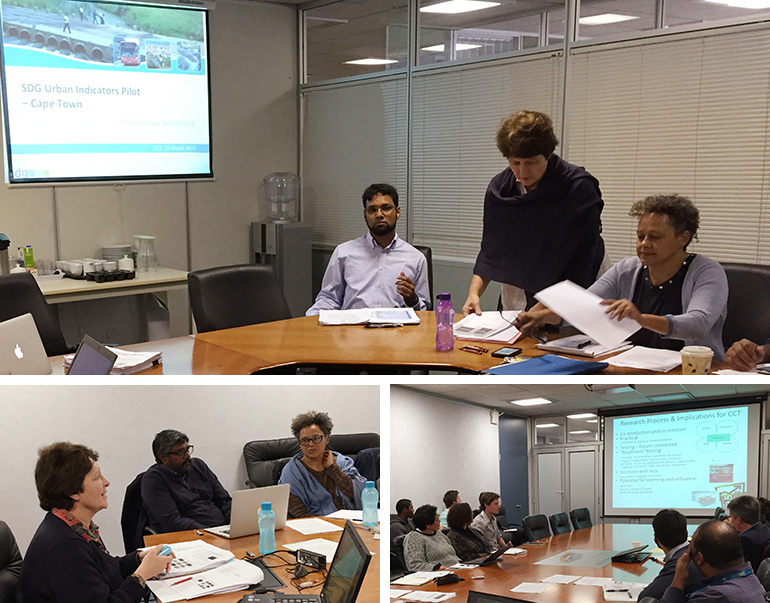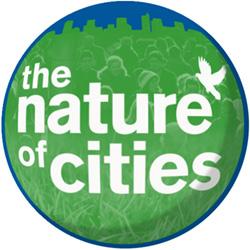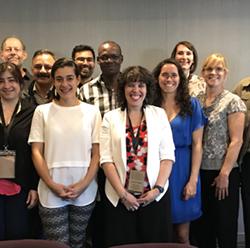Cape Town Input Informs UN Urban Sustainable Development Goal
Pictures: (above) The indicator group at the City of Cape Town meets for a workshop, (below) The Cape Town USDG pilot project feedback session to the City of Cape Town, 3 August 2015. Photo: Zarina Patel
The City of Cape Town reported back on their participation in the USDG Pilot Study at feedback sessions hosted by the University and the City at the end of July and early August respectively. Cape Town was one of five cities that undertook pilot projects to test the feasibility and usefulness of the proposed indicators and targets contained in the SDG Goal 11, which seeks to “make cities and human settlements inclusive, safe, resilient and sustainable”. In launching the Cape Town pilot in March 2015, the Mistra Urban Futures Director David Simon, describes this opportunity as “ideal … to undertake focused sustainability research which combines intellectual and applied dimensions”.
The Brown Bag seminar hosted by the African Centre for Cities was attended by an audience including approximately 50 academics from across disciplines, government officials and practitioners working in urban development. Helen Arfvidsson, lead researcher for the Mistra Urban Futures pilot project participated in the seminar via live streaming. She introduced the pilot project initiative, and provided background on the global development agenda and the UN’s processes for ratifying the SDGs. Carol Wright, Manager of Development Information (DI) in DI&GIS Department in the City of Cape Town, shared with the audience the research process and the implications of the project for the City of Cape Town. She indicated that being part of the pilot project was a unique opportunity to make a contribution, and to practice proactivity, by being able to prepare for future reporting requirements. Nishendra Moodley, director of PDG, provided the analytical framework and results of the pilot project study. The value of the process of the pilot project to the City of Cape Town was presented by Natasha Primo, the Head: Policy and Research in the DI&GIS Department of the City of Cape Town. Natasha spoke to the lessons learnt internally at the City, as well as the fact that the pilot project research can be used to inform immediate and future indicator work at the City. She, like Carol Wright, spoke to the capacity and tools required for such indicator work, and also emphasised the importance of partnerships for making the research possible. Finally, Helen Arfvidsson provided a synthesis of the cross city findings of the overall pilot project programme. The presentations were followed by an engaging discussion around the process, technical detail, innovation, the partnership and the international relevance, and the mutual learning throughout the process as well as during the presentation itself was lauded as a success of the collaboration between the City of Cape Town, the African Centre for Cities, PDG and Mistra Urban Futures. Copies of the Cape Town and other cities’ pilot projects can be found here.
The 14 City departments and members of the City’s (internal) indicator working group that were engaged in the research were invited to a feedback session at the City on the 3rd August. The session was attended by 20 City officials across 8 departments.
The feedback session followed a similar format to the ACC seminar, with Zarina Patel (CTLIP Director as a proxy for Helen Arfvidsson). Carol Wright described the value of the USDG Pilot for Cape Town as an opportunity to ‘proactively take this forward, rather than being a recipient of a process’. The City feedback session included an additional input from Natasha Primo on the DI&GIS department’s plans to take the USDG indicator work forward through current and proposed processes within the City and to inform a range of related external indicator work. The Pilot assisted in identifying indicator reporting and data gaps in the City, specifically regarding disaster risk management, open/green spaces and social development, and cultural heritage. As a direct outcome of the USDG pilot, initiatives have been proposed and included in the 2015/2016 departmental business plan. The City has a newly developed indicator reporting platform -currently only available internally to the City - which will be used to further disseminate and bed down the USDG experience and outcome-focussed urban development indicator work within the City.








